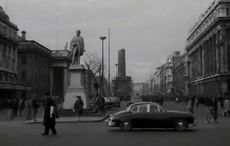Many readers have asked this week why Irish gay groups want to carry an identifying banner in the Saint Patrick's Day Parade in New York?
Here's the short answer: because if you are not seen you are not heard. And when you are neither seen nor heard, bad things can happen to you without anyone noticing. Gay people know this, but apparently quite a few others need to be reminded.
As the increasingly thuggish moves in Russia and Uganda and Nigeria have been reminding us for months now, legally enforced silence is biggest international enemy of LGBT rights. Each of those woefully discriminatory nations underline how often majorities can use the law to railroad and silence minorities.
And of course it doesn't just happen in far away countries we'll never visit. It's happening right here in the United States. Last week in Kansas the House of Representatives approved a bill to segregate gay people from straight ones in virtually every area of public life in the state that makes Vladimir Putin’s anti-gay ‘propaganda’ law look enlightened in comparison.
The Kansas bill, crafted to "protect" religious liberty, in fact torpedoed every legal gain of a marriage equality ruling before it could even occur. But it went much further. The law would allow any individual, group, or business to refuse to serve gay couples if they decide "it would be contrary to their sincerely held religious beliefs."
Shops could refuse gay couples all goods and services; hotels could throw them out or turn them away. Movie theaters, restaurants, any business that provides any kind of public service or accommodation could send them packing at the door.
And if a gay couple decide they are being discriminated against and pursue a legal challenge not only would they lose, thanks to the new bill they would have to pay their opponent's attorney fees.
It gets much worse. State hospitals could turn gay couples away or refuse to treat them without fear of consequence. Police officers could walk away if they notice the citizens in question are a gay couple. Public pools and public parks could ban gay couples without censure. The GOP are actually crafting segregation bills in America in 2014.
Thanks to the bill Kansas government employees would also be given permission to discriminate. Literally anyone who works for the state would have carte blanche to turn away gay couples.
Doctors, nurses, police officers, firefighters, pharmacists, attorneys, insurance providers, real estate agents, and even social workers could all refuse their help. Even in emergencies. No questions asked.
The new anti-gay bill is so broad that just the suspicion the service you provide could benefit a gay couple allows you to turn your back and also shields you from charges of discrimination.
In a for-the-ages moment of Orwellian double speak this week Republican State Representative Charles Macheers proclaimed on the House floor that 'discrimination is horrible. It’s hurtful… It has no place in civilized society, and that's precisely why we’re moving this bill.'
Forcing other people to live by your own fundamentalist principles is what freedom now looks like in Kansas.
The outcry over this odious bill was swift and national. So much so that on Friday GOP Senate President Susan Wagle expressed her growing concern that it had become politically radioactive. Wagle understood if they passed it the GOP nationally would become the authors of the first segregation bill of the modern era.
‘I vote no,’ said Republican Representative Don Hineman said on Friday. ‘My closely held religious belief is that God is love.’
Sanity prevailed, but it was a very close call. Many other majority GOP states are still preparing ‘religious exemption’ bills to separate and segregate. They’re only getting started.
So last week reminded us that the LGBT community must remain vigilant, and they must remain visible, because the moment their guard drops extremists publish Vladimir Putin like bills like the one the Kansas GOP tried to pass last week, across the world and right here in the United States.
Recall that gay rights were first fought in the language, then in the streets, then at the ballot box and in the courts. Along the way the community learned just how much LGBT visibility matters.
People need language to explain when a shockingly un-American thing is happening to them. Sometimes, as the civil rights protesters showed us years ago, they need a banner. If you’re seen and heard you have some stature. But invisibility allows your opponents to legislate you out of existence.
So Irish LGBT groups are correct in their wish to carry a banner. It conveys dignity and personhood. It reminds us of the cost of enforced invisibility.
A day will come when they no longer need to hold up those banners, but that day is nowhere in sight.




Comments